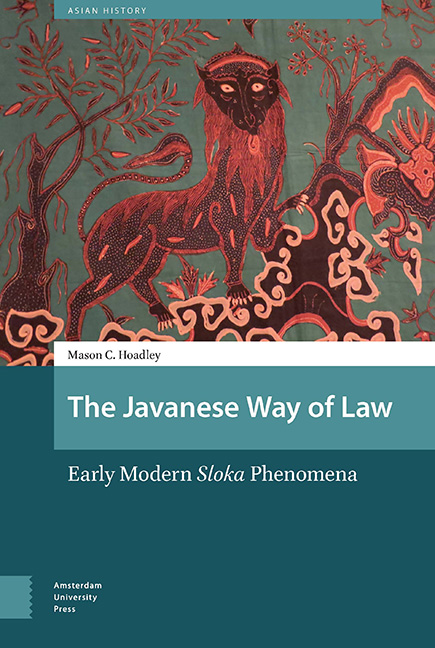1 - Traditional Law. Sloka in Pepakem
Published online by Cambridge University Press: 20 November 2020
Summary
If a single entity could stand for the contents of traditional law, it would be paragraph four of a text called the Wadigun Wangkara. The article opens by citing the Hindu concept of yuga (epochs) in the world's cosmic decline. In it the original four Sanskrit yuga are rephrased in the form of five Javanese terms representing stages of decreasing validity in legal claims. Highest on the scale is the Krţa/Satya Yuga, which becomes Javanese Tirta assuring victory; lowest, the Kali Yuga becoming Sengara, dooms a case to defeat. More important, explanation of the term marking the final epoch describes the king's efforts to counter the Kali era of darkness and deceit by creating rules communicated through the sloka phenomena. The extraordinary step of introducing innovations into the body of law customarily regulated by experience (drigama) was necessitated by ministerial evasion of their moral and professional duty in the face of the unexpected death of a high official's son. Unacceptability of ‘passing the buck’ through each minister deferring to the opinion of the others prompted the patih (prime minister, king's chief counsellor), Gajah Mada Amongpunggung, to reveal a sloka (proverb, maxim containing a simile, metaphor [esp. as a legal term]) constructed from the names of the five irresponsible mantri (palace officials). The result is a particularly damning description of their actions as ‘clearly smelling of evil’ (gandaning nyata), constituting punishable negligence based on the ‘crime of silence’ (sidhem pramanem). Pronouncement of the legal sloka was accompanied by the imposition of large fines levied from the errant ministers. This in turn established a sinalokan (a phrase composed of sloka elements), which became the custom of the realm. Not to be outdone, His Majesty Wijayang Sastra created (adeg) a reprimand in the form of two affairs (prakawis/prakara). These were aksara (legal precepts), which constitute categories of royal chastisement. As part of the standard dozen or so aksara, the two created by Wijayang Sastra were aksara geni ‘the order of a king who punishes’ and aksara bumi ‘the loyalty/steadfastness (kukuh) of the court’. The article closes with the statement: ‘End of the reading of the Wadigun Wangkara taken from Patih Gajah Mada’.
- Type
- Chapter
- Information
- Javanese Way of LawEarly Modern Sloka Phenomena, pp. 21 - 32Publisher: Amsterdam University PressPrint publication year: 2019

